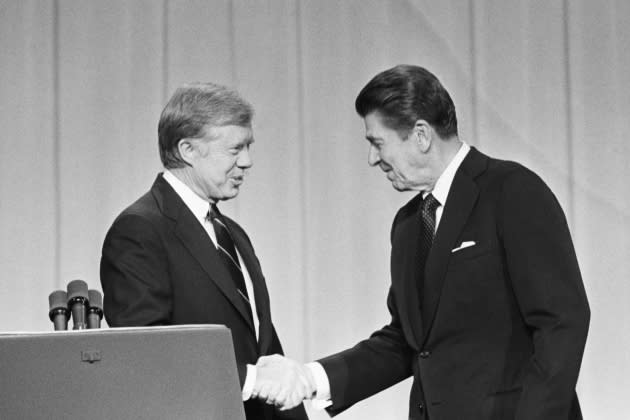Reagan Allies Schemed to Delay U.S. Hostages’ Freedom to Sabotage Carter, Alleged Witness Says
- Oops!Something went wrong.Please try again later.
- Oops!Something went wrong.Please try again later.
- Oops!Something went wrong.Please try again later.

Ben Barnes, a former Texas politician, is claiming he witnessed a plot to sabotage the reelection of President Jimmy Carter in 1980 by delaying the release of U.S. hostages in Iran. His stunning admission was reported by The New York Times on Saturday.
The hostage crisis in Iran blighted Carter’s presidency and his reelection campaign, and, with the hostages still unreleased on Election Day 1980, the incumbent lost badly to Ronald Reagan. In the four-plus decades since, many have argued he’d have fared far better had he secured the release of the 52 Americans held captive.
More from Rolling Stone
But Barnes told The Times that his mentor, former Texas governor John B. Connally Jr., was determined to not let that happen — and helped prevent the hostages’ release. Barnes says that summer, Connally brought him to several Middle Eastern capitals to convince the respective regional leaders to tell Iran that they would get a better deal from Republican nominee Ronald Reagan if they held the hostages until after the election. That is precisely what happened.
After they returned home from their trip, Barnes said that Connally briefed the chairman of Reagan’s campaign, William J. Casey, who later became the director of the Central Intelligence Agency. (Barnes’ account does not include any indication that Reagan knew anything about their trip.)
Known as the “October surprise,” many have suspected that someone close to Reagan’s camp was working against Carter’s efforts to free the hostages until after the election, but congressional investigations did not confirm those theories, and Connally was not a subject of those queries. Connally had sought the Republican nomination that Reagan ultimately won. His helping thwart Carter’s campaign, Barnes said, helped him make a case for becoming secretary of state or defense with a new administration.
Barnes — who served as speaker of the Texas House of Representatives and lieutenant governor, and who also helped George W. Bush get into the Texas Air National Guard — said he wanted to set the record straight, given that Carter is in hospice care. “History needs to know what happened,” he said. “I think it’s so significant and I guess knowing that the end is near for President Carter put it on my mind more and more and more. I just feel like we’ve got to get it down some way.”
While several of the players who could corroborate Barnes account have died — including Connally and Casey — Barnes named four people whom he had confided in about the meetings. All four — Mark K. Updegrove, president of the L.B.J. Foundation; Tom Johnson, a former aide to Lyndon Johnson (no relation) who later became publisher of the Los Angeles Times and president of CNN; Larry Temple, a former aide to Connally and Lyndon Johnson; and H.W. Brands, a University of Texas historian — confirmed with The Times that Barnes had shared his story with them.
“As far as I know, Ben never has lied to me,” Tom Johnson said. Other evidence backing up his account is also out there, including Brands having wrote three paragraphs about Barnes’ account in a 2015 biography of Reagan, though it didn’t receive much attention, and records at Lyndon Baines Johnson Library and Museum show Connally left on a trip from Houston on July 18, 1980 to visit Jordan, Syria, Lebanon, Saudi Arabia, Egypt, and Israel and returned on Aug. 11 — Barnes was listed as joining him.
Barnes told The Times he was certain the motivation for the trip was to deliver the message to Iran to hold the hostages until after the election. “I’ll go to my grave believing that it was the purpose of the trip,” Barnes said. “It wasn’t freelancing because Casey was so interested in hearing as soon as we got back to the United States.” Casey, he added, wanted to know whether “they were going to hold the hostages.”
Barnes could not confirm whether the messages to the regional leaders were actually delivered to Iran or if they had any influence. Iran held the hostages until after the election. They were released shortly after noon on Jan. 20, 1981, in the opening minutes of Reagan’s presidency.
John B. Connally III, the former governor’s eldest son, disagreed with Barnes’ account, telling The Times that he recalled his father taking the Middle Eastern trip, but that he did not know of any messages to Iran and that he had accompanied his father to a meeting with Reagan to discuss the visit.
“No mention was made in any meeting I was in about any message being sent to the Iranians,” said Connally. “It doesn’t sound like my dad.” He added: “I can’t challenge Ben’s memory about it, but it’s not consistent with my memory of the trip.”
Best of Rolling Stone
